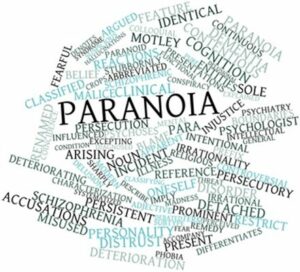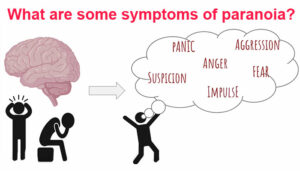In the past few years, there has been a rise in the number of people living with paranoia. You may know what it’s like living with paranoia. You might be one of the millions of people who suffer from this mental illness, or you may have noticed someone close to you who has voiced symptoms.
Contents
What Is Paranoia?
 Paranoia is characterized by a distrustful and suspicious attitude that can lead to irrational behaviors. So let us delve into different types of paranoia and their effects on the individual as well as society at large. It is a mental disorder characterized by delusions of persecution or grandeur, extreme suspiciousness, and a distorted view of reality. It usually begins with a period of doubt and uncertainty about one’s own relationships or experiences.
Paranoia is characterized by a distrustful and suspicious attitude that can lead to irrational behaviors. So let us delve into different types of paranoia and their effects on the individual as well as society at large. It is a mental disorder characterized by delusions of persecution or grandeur, extreme suspiciousness, and a distorted view of reality. It usually begins with a period of doubt and uncertainty about one’s own relationships or experiences.
The person with paranoia may start to believe that others are out to get them. That they are being spied on, or that their partner is cheating on them. Other common symptoms include feeling as though people are talking about them behind their back. And feeling as though they are being laughed at, and feeling that everyone is out to harm them in some way.
Am I Paranoid?
- Aside from the delusions that are characteristic of paranoia, you may notice that people are avoiding or ignoring you.
- You may find yourself constantly wondering if your friends actually like you or whether your partner is cheating on you behind closed doors.
- For some, paranoia can be very mild and they simply feel as though everyone is talking about them or laughing at them behind their backs.
- Many people suffer from paranoia for extended periods of time, but the symptoms usually become more severe over time.
Paranoia is often accompanied by psychotic symptoms like hallucinations and delusions, but it can also be an aspect of other mental disorders like schizophrenia or delusional disorder.
Symptoms of Paranoia

People who are affected by paranoia can have symptoms that are mild or severe. Some of the symptoms range from being overly suspicious to being completely delusional. The following are some symptoms of paranoid delusions:
1) Delusions of persecution – This is the most common type of delusion, in which a person believes that others intend to harm or harass them.
2) Delusions of reference – This is when a person believes that certain things in their environment have special meaning or significance for them.
3) Grandiose delusions – In this type, people believe they have great power or importance, such as being a famous person or having an ability no one else has.
4) Erotomanic delusions – This is when a person believes that another particular person is in love with them.
5) Nihilistic delusions – In this type, people believe they have no identity or something meaningful about their lives has been removed from them, such as the sensation of having nothing to look forward to in the future.
6) Delusions of control – This is the belief that another person or force is influencing their thoughts, feelings, impulses, or behavior in some way.
7) Somatic delusions – In this type, people believe they have a physical defect or general medical condition.
8) Religious delusions – In this type, people feel as though something has replaced their god or that they have sinned in a way against their god.
9) Grandiose delusions – In this type, people believe they have great power or importance, such as being a famous person or having an ability no one else has.
10) Erotomanic delusions – This is when a person believes that another particular person is in love with them.
Types Of Paranoia

Paranoia can range in intensity. The following are types of paranoia:
1) Persecutory type – This is the most common category, where a person believes that others intend to harm or harass them.
2) Erotic jealousy type – In this type, people believe their partner may be unfaithful to them, even though there is no evidence of this.
3) Hypochondriacal type – This is when a person believes they are seriously ill with no proof that they actually are, and spends excessive time researching medical history or symptoms.
4) Grandiose type – In this case, people believe they have special powers, privileges, talents, or extraordinary wealth.
5) Nihilistic type – In this type, people have no sense of self-identity or they believe that something meaningful about their lives has been removed from them (such as the sensation of having nothing to look forward to in the future).
6) Control type – People feel like other people or external forces are controlling their minds or thoughts.
7) Somatic type – This is the belief that they have a physical defect or general medical condition.
8) Religious type – Here people feel as though something has replaced their god, or that they have sinned in a way against their god.
9) Erotomanic type – People believe that another particular person is in love with them.
10) Rage type – People feel intense anger or rage for no reason and believe that others (usually of the same sex, such as a person’s spouse) are responsible for their feelings.
11) Unspecified type – Symptoms do not fit any other well-defined types, but still cause distress or impairment.
12) Mixed type – Symptoms fit more than one of the specific categories listed above or fit equally well in two or three.
Causes of Paranoia

There is no one cause of paranoia. Instead, it is thought to be caused by a combination of genetic and environmental factors. A person’s upbringing can have a big influence on their personality, so if they are brought up to be anxious, suspicious, or angry about the world around them then it could cause paranoia. It is also common for people with schizophrenia to suffer from symptoms of paranoia. Some researchers think that severe sexual abuse during childhood may cause paranoia later in life.
Genetic Factors
About half of all people with paranoid ideas have a family history of similar thoughts. This shows there may be a genetic component to paranoia, but it cannot explain everything.
Environmental Factors
People who are abused during childhood or exposed to violence and abuse as adults are more likely to develop paranoid thoughts or fears than those who were not exposed to these negative conditions.
Prevention from Paranoia

There is no known way to prevent paranoia, but it may be possible for people to learn the underlying causes and find ways of managing their fears. They can do that by-
- Talking to their doctors about the possibility of developing paranoia and explaining what they feel.
- Listening to calming music when they start feeling paranoid.
- Reminding themselves that their fears and thoughts are probably unfounded and irrational. Even if they do not believe it at that moment in time.
- Getting plenty of sleep and exercising regularly, both help keep the body healthy, relieve stress, and can improve mood.
- Trying to relax during the day by doing activities such as yoga, tai chi, or meditation.
- Finding supportive friends and family members who will listen without judging, reassure them that it is hard to accept these irrational fears. However, they believe that person has rational reasons behind his fear.
- Confiding with a trusted friend or family member.
- Turning to spiritual leaders for help and guidance.
- Take their prescribed medication as directed, even if they feel better.
Treatment for Paranoia

Paranoia is usually treated with a combination of medications and psychotherapy. Medications such as antipsychotics, antidepressants, benzodiazepines, and beta-blockers may help to reduce the symptoms of paranoia. Cognitive-behavioral therapy (CBT) can also be used alongside medication in order to treat paranoid thoughts and feelings. There is no specific treatment that helps everyone with paranoia. However, there are things a person can try to help improve their symptoms:
Blindspot training
In this type of therapy, a person learns how to look at themselves honestly without making negative assumptions. The therapist helps the patient learn how to notice their own negative thoughts. And break them down to understand how they are unhelpful.
Cognitive Behavioral Therapy (CBT)
This type of therapy helps a person identify patterns in their thinking that trigger anxiety or paranoia. Then works with the patient to find ways to change these thoughts. For example, if someone has the thought “I feel unsafe,”. Then the therapist helps them learn how to come up with a more realistic thought, such as “I am safe right now.”
Group therapy
In some cases, people find that talking about their feelings and working through them as a group can help.
Medication

- Antidepressant medications are often used when paranoia is associated with depression.
- Anti-psychotic medications are also helpful for treating some types of paranoia.
Benzodiazepines: This type of medication is used to treat symptoms of anxiety, such as restlessness or an inability to sleep.
Beta-blockers: This type of medication is used to treat trembling and shaking. Some beta-blockers can also help lower a person’s blood pressure.
Sleep medications: Some sleep medications may be helpful for people who have difficulty falling asleep due to their symptoms of paranoia.
Self-help
If you are feeling paranoid, avoid dwelling on your fears and try to spend time with other people. This can help distract you from your paranoia. Try not to obsess over past events or negative feelings. Instead, use a relaxation technique such as deep breathing to calm yourself down when you start to feel anxious or afraid.
Getting Help
If you are troubled by feelings of paranoia that are affecting your ability to work or enjoy life, seek help from a health care professional. You can also seek help if you feel threatened by someone who is acting paranoid or experiencing symptoms of paranoia.
Self Care Tips For Coping With Paranoia
There are a few things that can help people cope with paranoia when it arises. Some self-care tips include:
1. Avoid dwelling on your fears and try to spend time with other people. This can help distract you from your paranoia.
2. Try not to obsess over past events or negative feelings. Instead, use a relaxation technique such as deep breathing to calm yourself down when you start to feel anxious or afraid.
3. Get help from a health care professional if you are troubled by feelings of paranoia that are affecting your ability to work or enjoy life.
4. Seek help if you feel threatened by someone who is acting paranoid or experiencing symptoms of paranoia.
5. Relaxation techniques – Deep breathing, holding ice cubes in your hand for a short time, guided imagery, yoga, progressive muscle relaxation.
Conclusion
This blog post has introduced you to a number of different aspects and causes of paranoia. We hope that by the end of this article, you have learned some new information about what it is like to live with paranoid thoughts or feel them at all for that matter. It might be hard but if someone does notice any symptoms. So please seek help from professionals who are trained in how to deal with such issues. Remember: You’re not alone!
A Word From Therapy Mantra
Your mental health — Your psychological, emotional, and social well-being — has an impact on every aspect of your life. Positive mental health essentially allows you to effectively deal with life’s everyday challenges.
At TherapyMantra, we have a team of therapists who provide affordable online therapy to assist you with issues such as depression, anxiety, stress, workplace Issues, addiction, relationship, OCD, LGBTQ, and PTSD. You can book a free therapy or download our free Android or iOS app.


